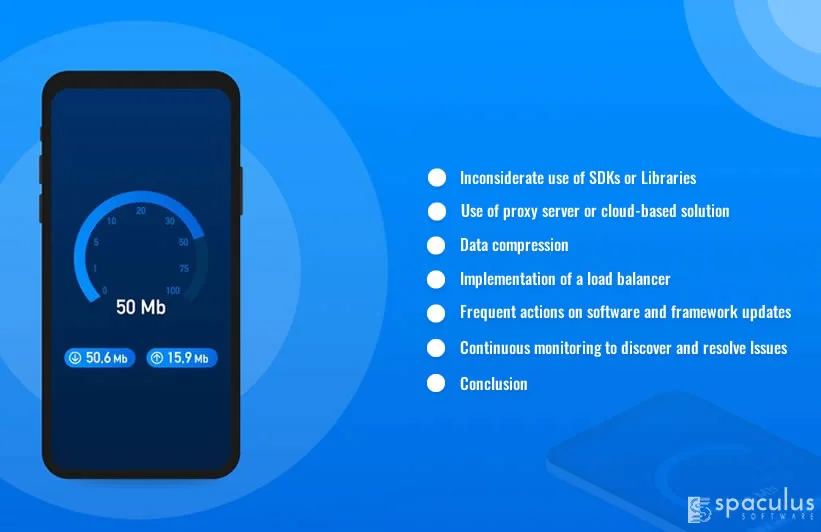
For businesses to create a mass appeal, they must deliver a mobile app that focuses on high quality and exceptional user experience. Having a great mobile app also helps entrepreneurs combat intense competition in their niche market. With app users spending as much as $86 million dollars on in-app purchases and subscriptions, tech entrepreneurs are compelled to strive for excellence and connect with customers through a robust, engaging mobile app.
Mobile app developers, on the other hand, must consider building an app that aligns perfectly with company’s vision. Hence, it is important to develop an app that delivers unblemished performance and fast loading speed to retain maximum users. Slow load speed defines mediocre app performance, which compromises business reputation. The key to success is speed optimization.
To save the frustration and boost ROM (Return on Mobility), here are the most effective ways to optimize app performance and accelerate app loading speed:
Imprecise decisions about using flawed libraries and SDKs can lead to bug-ridden app performance that ultimately results in slow loading of pages and other grave issues. Using development tools and APIs are an undeniable choice; however, it is crucial to check them for bugs and imperfections before actually depending on them. If not checked thoroughly, it can even make a mobile app crash. Run your research to and test its code to ensure the chosen library has positive reputation and is secure for your app.
The app server plays a crucial role when user waits for the app to load fully. At times, users often whine about how your app does not have enough speed. The reason why this happens is that the server undergoes a lot of tasks as it processes the code and access data files, which may make it overloaded at times. Server taking more time to load can also be attributed to insufficient server memory. In any case, user being left to wait is definitely not a good sign.
The best way to unburden the server is to implement a proxy server. With this, adding more pages to your app will not impoverish loading speed. Alternatively, you can also implement a cloud-based server which is a surefire way to enhance performance and make the app more scalable for future expansion.
Having an overwhelming amount of data can directly affect the loading speed. Developers therefore need to take care of running the files at better pace using standard compression methods. Compressing data files, esp photos and videos, further accelerates app performance. If engineered correctly, perfect compression standard of photos, videos and music will have lower magnitude of size, creating much-needed optimization.
There are many options for open-source tools that can help compress images, music, videos and other heavy data. Text files that includes plain text HTML, CSS and JavaScript code should necessarily be compressed before transmitted in order to shield app performance from negative impact especially at the time of slow connections.
Content compression can help bring down the bandwidth requirement of HTML, JavaScript and CSS by almost 30% and improves load time.
As for SSL, compressing the files means reduction in the amount of data that needs encoding, which liberates CPU from consuming time required for data compression.
Load balancer is the best option to manage traffic rush and improve security and performance of a mobile app without building a big, ambitious core server. Load balancer can help distribute the traffic across several servers and maintain good user experience even when the app is written poorly or has scalability issues.
Lad balancer supports more than one application servers and works like a reverse proxy server driving traffic requests to another active server. This prevents servers from getting overloaded, splitting requests among different servers to dramatically sustain app performance standard.
Trying to push outdated version of software for a solution will not work in your favor as it decelerates app loading speed as well. New versions are often released and not updating the existing app version compromises not just the app speed but also intimidates its security. Fresh updates help make the most out of fixes, enhancements and improved compiler. Staying up-to-date with latest releases and implementations developed by engineers thus can build a wall against the loss of speed and data.
Monitoring your app for ongoing and future problems is key to preventing big, sizeable troubles like slow performance and app crash. The skilled performance of application developers would be worth it if you keep a close eye on its real-world performance and live activities across specific devices and infrastructures in given timeframe.
Despite being passive, live monitoring will intimate you on problems on the spot. Once discovered, issues can be handled by the combined efforts of developers and testers in a timely manner.
A few good app performance monitoring tools include:
The issues these tools help discover may include:
The app performance data thus derived through precise monitoring helps you learn whether your optimization tactics are doing good to users and if there is a need to add more boost to its traffic handling capability.
The performance improvement and optimization techniques described above are effective methods to ensure your app delivers significant performance and speed even in the high-traffic moments. However, if you want to experience substantial effect and multifarious gains, you must invest time for brainstorming and collaborate with an app development company seasoned in implementing all the holistic technology-powered solutions.
You may consider consulting with Spaculus to make a mobile application that emerges superior in the market and yields exhilarating user experience with an addictive loading speed. After all, you deserve an appreciable ROI and we would make sure you hit the goal in time.
App Development